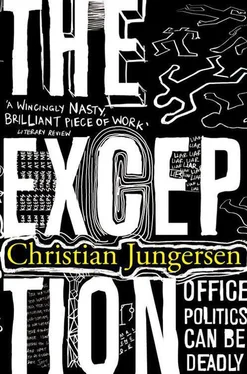Christian Jungersen - The Exception
Здесь есть возможность читать онлайн «Christian Jungersen - The Exception» весь текст электронной книги совершенно бесплатно (целиком полную версию без сокращений). В некоторых случаях можно слушать аудио, скачать через торрент в формате fb2 и присутствует краткое содержание. Год выпуска: 2010, Издательство: Orion Books, Жанр: Современная проза, Триллер, на английском языке. Описание произведения, (предисловие) а так же отзывы посетителей доступны на портале библиотеки ЛибКат.
- Название:The Exception
- Автор:
- Издательство:Orion Books
- Жанр:
- Год:2010
- ISBN:нет данных
- Рейтинг книги:3 / 5. Голосов: 1
-
Избранное:Добавить в избранное
- Отзывы:
-
Ваша оценка:
- 60
- 1
- 2
- 3
- 4
- 5
The Exception: краткое содержание, описание и аннотация
Предлагаем к чтению аннотацию, описание, краткое содержание или предисловие (зависит от того, что написал сам автор книги «The Exception»). Если вы не нашли необходимую информацию о книге — напишите в комментариях, мы постараемся отыскать её.
The Exception — читать онлайн бесплатно полную книгу (весь текст) целиком
Ниже представлен текст книги, разбитый по страницам. Система сохранения места последней прочитанной страницы, позволяет с удобством читать онлайн бесплатно книгу «The Exception», без необходимости каждый раз заново искать на чём Вы остановились. Поставьте закладку, и сможете в любой момент перейти на страницу, на которой закончили чтение.
Интервал:
Закладка:
Over the seven hundred years of its existence, Königsberg’s population had grown to 380,000, but when it surrendered only around a hundred thousand remained. Many had fled to the city from the countryside to the east of it; others were families on the run from the bombing raids on Berlin.
The American diplomat and historian George Frost Kennan flew over the deserted East Prussian land. He wrote in his memoirs: ‘The Russian invasion is a catastrophe for this region that has no counterpart in contemporary Europe. In many areas the original population has been decimated so that hardly a man, woman or child remains alive; it is impossible to believe that they all managed to escape to the West.’
After the defeat of Germany this part of the old Prussian territory came under Soviet rule. This meant that three-quarters of the remaining population of Königsberg died from sickness and starvation. The 25,000 survivors were deported in 1947 to what was to become the newly designated DDR. Some ended up in Nazi-built concentration camps, which were now used by both the Polish and the Soviets. Here, about 75 per cent of the prisoners died, mainly from starvation, typhus and torture.
Expulsions in the post-war years
The forced displacement of civilians from the old German provinces of East Prussia, Silesia and Pomerania continued during the post-war years. Stalin, at his meetings with Churchill and Roosevelt, insisted on holding on to the parts of Poland that the Soviet Union had annexed after Stalin’s pact with Hitler in 1939. Poland therefore had to be compensated. At the Tehran conference in December 1943, Churchill used three matches to demonstrate how this could be done: he put down two matches first, removed the right one and added a new match to the left of the remaining one.
In the real world, this shift in Polish territory led to the removal of 3 million Germans from their old homeland, which now belonged to Poland, and the relocation of the displaced people. They were left to fend for themselves and make a living as best they could. The emptied rural areas and towns were then to be repopulated by the 3 million Poles deported from the new Soviet territory.
With callous brutality, Germans were also driven out of German-speaking regions in Czechoslovakia, Hungary, Yugoslavia and other European countries. They lost their homes and all property that they could not carry.
Europe’s largest ethnic-cleansing operation
More than 15 million Germans were expelled from their native regions. Also, over 2 million German civilians either were murdered or died from starvation, cold or the terrible ordeals they endured during 1945 and the first five years after peace was declared. Sheer numbers make this one of Europe’s largest genocides and it wiped out East German culture.
No one doubts the correctness of the figures, which are based on documentation in German archives. Despite this, international research has paid relatively little attention to this mass extermination.
In the Encyclopedia of Genocide , the deportation of Germans is referred to in a table listing the greatest genocides of the twentieth century, but there is no separate article describing it. This work of reference does, however, include long articles about other, numerically smaller genocides.
Similar weaknesses are found in other standard works, such as Century of Genocide and The History and Sociology of Genocide . Nobody contradicts the fact that the post-war forced displacement of Germans was one of the largest Europe has ever seen, but it is also true that nobody has chosen to write about it at any length. It is not difficult to understand why this should be.
‘The Germans started it.’
No serious researcher would like to be associated with changing the emphasis placed on the German slaughter of Jews, Slavs, gypsies and homosexuals. It was indeed the Germans who systematised genocide and constructed machinery that made killing people more efficient than ever before.
It follows that the question of guilt is critical. Can German children be held responsible for unimaginable crimes against humanity committed by their older male relatives? The Nazis themselves would have argued that this is the case: according to their principles, whole populations are rightly punished for the crimes of individuals.
But do we still think this way today?
An information gap
Even though academic interest in the ethnic cleansing of Germans has increased a great deal during recent years — both inside and outside Germany — it can still be difficult to find precise and objective information. For instance, if one tries to look up the greatest shipping disaster in the world — the sinking of the Wilhelm Gustloff — there is no entry in the Danish National Encyclopedia, Encyclopaedia Britannica or the large German encyclopaedia Brockhaus .
Web searches on the German words ‘ Vertreibung ’ (‘expulsion’) and ‘ deutsche ’ (‘German’) and on ‘1945’ produce many thousands of links, mostly to the large societies supporting German displaced persons. The objectivity of such societies is obviously questionable. A search on the corresponding English words results in a much more compact collection of links.
However, many of these sites display distorted narratives of the history of the Second World War and especially of the Holocaust. Although they claim to provide neutral, academically valid research results, much is in fact written by those who deny the reality of the Holocaust. In many cases, Holocaust denial is a symptom of alignment with neo-Nazi organisations.
DCGI arranges a conference about the German expulsion
In other words, it is still difficult to find reliable information about this particular genocide and especially for those not professionally concerned with genocide research. Highly tendentious books and websites are mixed in with more valid sources.
This is why DCGI will be holding a public conference about the expulsion. The conference will take place on the 15–17 May. The Centre hopes it will help support new research and detach the knowledge of this tragedy from the home pages created by those who aim to falsify history.
Set these dates aside now. Further information about the programme and registration will be available in a later issue of Genocide News.
14
Frederik Thorsteinsson, the head of the Centre for Democracy, which promotes the use of democratic practices in East European countries, is also the deputy chairman of the DCGI board. Frederik is the only man on the board who is younger than Paul, which might have something to do with Paul’s dislike of him.
Frederik’s main academic subject was history. His doctoral thesis, ‘The Origins of the Democratic Tradition in Denmark’, was completed at an unusually early age and was awarded Copenhagen University’s Gold Medal. After a stint at the Modern History Research Unit at Roskilde University, he landed the post at the Centre for Democracy and then the place on the DCGI board.
It was not long before Frederik and Paul had their first skirmish. They disagreed about how to handle an information project in Republika Srpska, the Bosnian Serb republic. During the week of the worst infighting, the DCGI staff held their Christmas party in a chic lakeside restaurant. Late that evening, Paul, Malene and Iben ended up in a club in Nørrebro, full of stragglers from umpteen other Christmas dinners.
In the middle of the noise and music Paul suddenly confided in Malene: ‘Malene, don’t you see that Frederik is only in it for himself? That’s why he’s always so fucking astute and politically correct. All he thinks about is his own career. I mean, can you point to one single ethical value he’d stick to if it wasn’t in his own interest?’
Читать дальшеИнтервал:
Закладка:
Похожие книги на «The Exception»
Представляем Вашему вниманию похожие книги на «The Exception» списком для выбора. Мы отобрали схожую по названию и смыслу литературу в надежде предоставить читателям больше вариантов отыскать новые, интересные, ещё непрочитанные произведения.
Обсуждение, отзывы о книге «The Exception» и просто собственные мнения читателей. Оставьте ваши комментарии, напишите, что Вы думаете о произведении, его смысле или главных героях. Укажите что конкретно понравилось, а что нет, и почему Вы так считаете.












